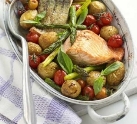
Clinical Nutritionist, Suzie Sawyer for www.feelaliveuk.com shares some tips for treating yourself to a full body MOT
- One in six people is still fearful of contracting Covid-19 with stress levels high[1]
- New UK research suggests reduced intake of specific micronutrients relates to increased risks of serious infections[2]
- Almost half of Brits say they have put on weight since the beginning of lockdown[3]
As life slowly starts to return to some sort of normality, albeit a ‘new normal’, and lockdown restrictions are eased, it’s a great opportunity to re-set, re-boot and revitalise health. Life has been very different for most people over the last few months and health may well have been pushed onto the back burner.
However, now is a great time to emerge from lockdown with heightened awareness of health, what it takes to support the immune system, to banish energy dips and bring your brain back into sharp focus. This includes keeping the mind calm and balanced during these stressful times. All a perfect backdrop to be kind to your body by giving it a health MOT.

#1. Enjoy colour
With work patterns and daily life disrupted as well as many people still being in a state of flux, making complicated dietary changes can be challenging. Adopting some simple rules to support the immune system is essential and that starts with colour. Colourful food (think of a rainbow) will provide:
Polyphenols (plant compounds) that deliver a wealth of antioxidants and an array of other immune-supportive nutrients. Fruits and vegetables, rich in polyphenols, are also loaded with vitamin C, our main immune-boosting nutrient. New research[4] looking at the link between nutrition and the immune system, and specifically focussing on vitamins A, C, D, E, B6 and B12 plus a number of other key nutrients, concluded that public health officials should be encouraged to include nutritional strategies in their recommendations to improve public health.
What we eat, and bridging nutrient gaps is essential to a health MOT. Just by including more fruits and veggies in the diet (fresh or frozen are great), you will be consuming key trace minerals (micro minerals needed for all body functions and which must be obtained from food). Many of us are widely deficient, particularly magnesium. Plus, the more stressed we are, the more energising B nutrients are quickly depleted. Certain B vitamins, especially B6 is an essential co-factor needed to produce adrenaline and cortisol, our two key stress hormones produced by the adrenal glands. Additionally, our mood-booster brain neurotransmitters, serotonin, and dopamine, also requiring B6, are essential for helping the body cope with stress and are suppressed by high cortisol. Plus, the flushing out of the calming mineral magnesium via the urine, is enhanced during stressful times. Magnesium’s function in the stress response is multi-factorial, but primarily down to its essential role in the serotonergic, adrenergic, and multiple neurotransmitter systems[5] . The more stressed we are, the more we are going to need; simple as!
And, eating colourful foods, especially green leafy vegetables, are vital when we are feeling frazzled as they are rich in the restful nutrient – magnesium. Adopting nutrient rich dietary habits is also great for the heart, digestive system and skin.
The immune system also requires a range of other nutrients including:
- Iron: Contributes to normal energy metabolism, cognitive function, formation of red blood cells and haemoglobin, oxygen transport in the body and the reduction of tiredness and fatigue. Food sources: Black liquorice, eggs, red meat, fortified grains and bread.
ALIVE! FACT: More than a quarter of women aged 19 to 64 years (27%) have iron intakes below the lower reference nutrient Intake (RNI).[6]
- Vitamin A: Helps metabolise iron, maintain healthy mucous membranes, immune function, skin and vision, plus cell specialisation. Food sources include: retinoids; animal sources (egg yolk, cheese, liver) beta-carotene; vegetable sources (carrots, squash, sweet potatoes).
ALIVE! FACT: One in 10 UK males aged 19 to 64 years have vitamin A intakes below the lower RNI.[7]
And keep topped-up with all these nutrients, easily depleted but essential nutrients by taking a daily multivitamin and mineral such as Alive! Ultra Wholefood Plus – www.feelaliveuk.com. It’s like having a very cost-effective health insurance policy, delivering your daily nutrient, immune and energy-boosting requirements, just when you need them most.

#2. Start afresh
When life is tough, our default is to ‘treat’ ourselves as means of coping with difficult situations. It’s no secret that many people have increased their alcohol intake as well as consumption of sweet or generally unhealthy snacks, which has also led to weight gain. Unfortunately, sugar in all its forms depletes the body of vital nutrients, especially those needed to support the immune system. If you can turn your mind set to a new and fresh start post lockdown, it can often help with motivation and keep you away from temptation. Keeping blood sugar levels in good balance by eating protein at every meal will help curb the cravings.

#3. Calming foods
Importantly, excess alcohol and sugar tend to exacerbate anxiety and we know that around 70% of the population reported suffering at the height of the outbreak. There are plenty of foods that can really help soothe frayed nerves. One of the best starts to the day are oats for breakfast. This can be in the form of porridge or oats soaked overnight in a little milk or unsweetened apple juice.
Oats are packed with resistant starch which is slowly released into the blood stream. This avoids blood sugar spikes and delivers plenty of the amino acid tryptophan needed to produce the brain neurotransmitter serotonin, a lack of which exacerbates anxiety. Natural yoghurt is great added to your oat breakfast because it contains probiotics that feed the good gut bacteria, promoting feelings of calm, plus contains plenty of protein. Regularly on the lunch or dinner menu should be salmon because it’s high in the omega-3 fats, eicosapentaenoic acid (EPA) and docosahexaenoic acid (DHA), that help regulate both serotonin and dopamine neurotransmitters, essential for calm.
Why not try this super-easy and colourful recipe using salmon, asparagus and cherry tomatoes, all cooked in one pan.https://www.bbcgoodfood.com/recipes/one-pan-salmon-roast-asparagus

#4. Sharp focus
For those who haven’t been working through lockdown or feel their brain needs a sharp shot, then now’s the time to get some focus into your diet and feed your brain. There are some evidence backed plant ingredients known to improve cognition and generally power up the brain since they work on all the different brain pathways such as the health herbal hero – Rhodiola rosea. Known as an adaptogen, this powerful herb helps supports the brain and body through stressful times and delivers some much-needed energy. Vitano Rhodiola tablets are a natural herbal supplement which can help with the temporary relief of symptoms associated with stress such as fatigue and exhaustion www.vitano.co.uk .
And if you really want a brain refresh and a boost to memory acquisition[8] then another plant gift from nature is Bacopa monnieri. An Ayurvedic herb, Bacopa monnieri has probably the most scientific research regarding its mechanisms and positive effects on brain health of any herb[9]. This brain-boosting herb can be found in Bod Bright Brains – bod-uk.com. Additionally, vitamins B6, B12 and folate are key nutrients for breaking down homocysteine, high levels of which can be very detrimental to long-term brain health. Make sure you’re feeding your brain these key B-vitamins, plus the whole family of B-vitamins found in the Alive! range of tablet and gummy supplements – www.feelaliveuk.com.